Storytime Announcement (tune: Yankee Doodle)
Please turn down your cell phones now,
So they will not distract us.
Please join along and sing the songs,
It always helps to practice.
Storytime can help us read.
Storytime is what we need.
Storytime is lots of fun!
Storytime’s for everyone.
EarlyLiteracy Aside--Explain: When you participate in storytime with your children you send them the message that what we do in storytime is important. You let them know that reading is important and enjoyable, worth doing. They love to do things with you. By being present you help to support their print motivation, their enjoyment of books and reading. This will later help them stick with learning to read even if it is difficult for them.
Submitted by Mary Binda, Augusta County (VA) Public Library

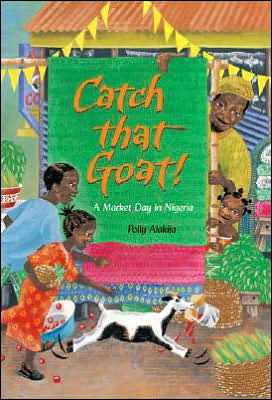 Early Literacy Aside--Explain: Today we're going to highlight narrative skills. This is the ability to describe things and to talk about events and tell stories. Researchers have noted this skill as one of the early literacy skills that will help your child be ready to read. It helps children
Early Literacy Aside--Explain: Today we're going to highlight narrative skills. This is the ability to describe things and to talk about events and tell stories. Researchers have noted this skill as one of the early literacy skills that will help your child be ready to read. It helps children 
 Early Literacy Aside--Explain: Researchers have found that one of ways you can support later reading is by helping children hear the smaller sounds in words. This skill is called phonological awareness. Today I'll point out some thing you can do to help your childrne develop this skill.Early Literacy Aside--Example: Rhyming is one way that children learn to hear that words are made up of smaller parts. By doing rhymes with your children you are setting the stage for them to sound out words to read.
Read Train Song
Early Literacy Aside--Empower: Find a book at home which has rhyming words and see if your child can identify words that rhyme. If you don't have a rhyming book, just read a book and then pick a word and think of rhyming words together.
Early Literacy Aside--Explain: Researchers have found that one of ways you can support later reading is by helping children hear the smaller sounds in words. This skill is called phonological awareness. Today I'll point out some thing you can do to help your childrne develop this skill.Early Literacy Aside--Example: Rhyming is one way that children learn to hear that words are made up of smaller parts. By doing rhymes with your children you are setting the stage for them to sound out words to read.
Read Train Song
Early Literacy Aside--Empower: Find a book at home which has rhyming words and see if your child can identify words that rhyme. If you don't have a rhyming book, just read a book and then pick a word and think of rhyming words together.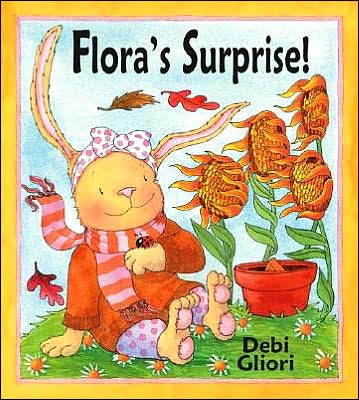 Early Literacy Aside--Example: This is a favorite book of mine. It shows children enjoying planting seeds and also how children think, in interesting ways. Let your child know when you are reading a favorite book of yours. This helps develop print motivation.Read Flora's Surprise
Early Literacy Aside--Example: This is a favorite book of mine. It shows children enjoying planting seeds and also how children think, in interesting ways. Let your child know when you are reading a favorite book of yours. This helps develop print motivation.Read Flora's Surprise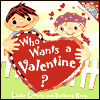 Early Literacy Aside--Explain: Researchers have found that children with a large vocabulary, who have heard a lot of different words, find it easier to learn to read when the time comes.Read Who Wants a Valentine?
Early Literacy Aside--Example: Don't replace unfamiliar words, use them and explain them if necessary. For example: "Tea for two?/ I decline./ I don't want a valentine." I didn't change the word decline, I explained it: decline means to say no.
Early Literacy Aside--Explain: Researchers have found that children with a large vocabulary, who have heard a lot of different words, find it easier to learn to read when the time comes.Read Who Wants a Valentine?
Early Literacy Aside--Example: Don't replace unfamiliar words, use them and explain them if necessary. For example: "Tea for two?/ I decline./ I don't want a valentine." I didn't change the word decline, I explained it: decline means to say no.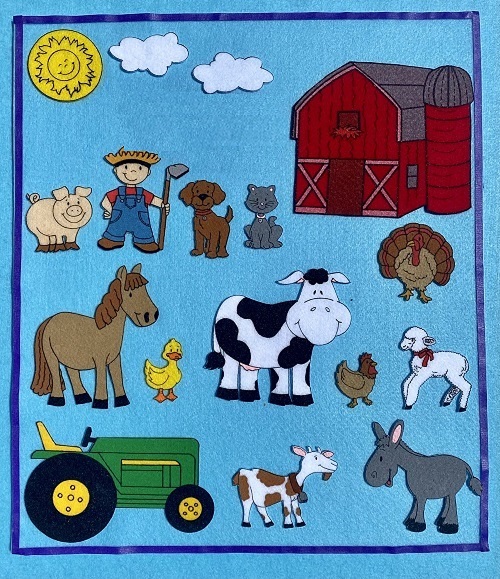
 I fed my duck under yonder tree.
Duck goes quack, quack,
Cat goes fiddle-i-fee.
Keep adding verses one-by-one:
Bought me a dog and the dog pleased me,
I fed my dog under yonder tree.
Dog goes bow-wow, bow-wow,
Horse goes neigh, neigh,
Cow goes moo, moo,
Pig goes oink, oink,
Sheep goes baa, baa,
Goose goes hissy, hissy,
Duck goes quack, quack,
Cat goes fiddle-i-fee.
Early Literacy Aside--Example: This song includes some silly animal sounds which is the beginning of making the child aware of the sounds within words.
I fed my duck under yonder tree.
Duck goes quack, quack,
Cat goes fiddle-i-fee.
Keep adding verses one-by-one:
Bought me a dog and the dog pleased me,
I fed my dog under yonder tree.
Dog goes bow-wow, bow-wow,
Horse goes neigh, neigh,
Cow goes moo, moo,
Pig goes oink, oink,
Sheep goes baa, baa,
Goose goes hissy, hissy,
Duck goes quack, quack,
Cat goes fiddle-i-fee.
Early Literacy Aside--Example: This song includes some silly animal sounds which is the beginning of making the child aware of the sounds within words. Submitted by Anna Hancock, Cincinnati (OH) Public Library
Submitted by Anna Hancock, Cincinnati (OH) Public Library
 There for all to see.
You may blow one candle out,
There for all to see.
You may blow one candle out, 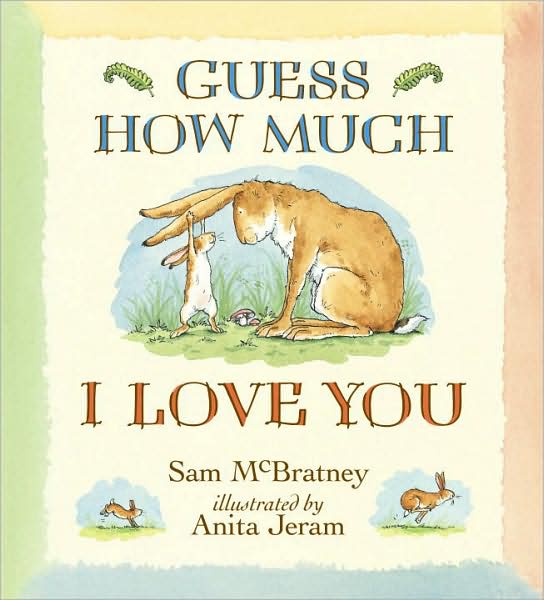 Our next book is Guess How Much I Love You by Sam McBratney.Early Literacy Aside--Example: This is my favorite book from my son's early years. We would read this one every night and we both knew the book word for word. Having a positive interaction with books and reading is an example of print motivation, helping children to associate reading with enjoyment.
Submitted by Karri Marshall, Lane (OH) Public Libraries
Our next book is Guess How Much I Love You by Sam McBratney.Early Literacy Aside--Example: This is my favorite book from my son's early years. We would read this one every night and we both knew the book word for word. Having a positive interaction with books and reading is an example of print motivation, helping children to associate reading with enjoyment.
Submitted by Karri Marshall, Lane (OH) Public Libraries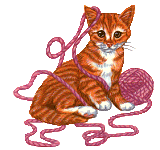 To look in a birds nest; then there were three.
Three little kittens wondered what to do.
One saw a mouse, and then there were two.
Two little kittens playing near a wall.
One little kitten chased a red ball.
One little kitten with fur soft as silk,
Left all alone to drink a dish of milk.
To look in a birds nest; then there were three.
Three little kittens wondered what to do.
One saw a mouse, and then there were two.
Two little kittens playing near a wall.
One little kitten chased a red ball.
One little kitten with fur soft as silk,
Left all alone to drink a dish of milk. [New words in this book: activities, camera lens, grinning, waddle, amazing, developed]Listen to the interesting words in this book as I read it.
Read the book.
Early Literacy Aside--Example: Hearing new words in books helps your child learn lots of words and the more vocabulary they learn the more they will understand what they will read.
[New words in this book: activities, camera lens, grinning, waddle, amazing, developed]Listen to the interesting words in this book as I read it.
Read the book.
Early Literacy Aside--Example: Hearing new words in books helps your child learn lots of words and the more vocabulary they learn the more they will understand what they will read.
 Early Literacy Aside--Explain: We are going to have fun playing with sounds today, reading stories with sound words. Playing with sounds helps develop phonological awareness which will help your child learn to hear the smaller sounds in words.Read book emphasizing sound words like crunch and munch. Then I go back to some pages and have the children say the words with me, again emphasizing different sounds.
Early Literacy Aside--Example: Hearing and learning sound words like splish-splash is an enjoyable way of learning phonlogical awareness and will help your children later hear smaller sounds in words.
Early Literacy Aside--Empower: At home, play with sound words, like splish-splash in the bath, crunch-munch at snack, and exaggerate how you are saying words to practice hearing their parts.
Early Literacy Aside--Explain: We are going to have fun playing with sounds today, reading stories with sound words. Playing with sounds helps develop phonological awareness which will help your child learn to hear the smaller sounds in words.Read book emphasizing sound words like crunch and munch. Then I go back to some pages and have the children say the words with me, again emphasizing different sounds.
Early Literacy Aside--Example: Hearing and learning sound words like splish-splash is an enjoyable way of learning phonlogical awareness and will help your children later hear smaller sounds in words.
Early Literacy Aside--Empower: At home, play with sound words, like splish-splash in the bath, crunch-munch at snack, and exaggerate how you are saying words to practice hearing their parts.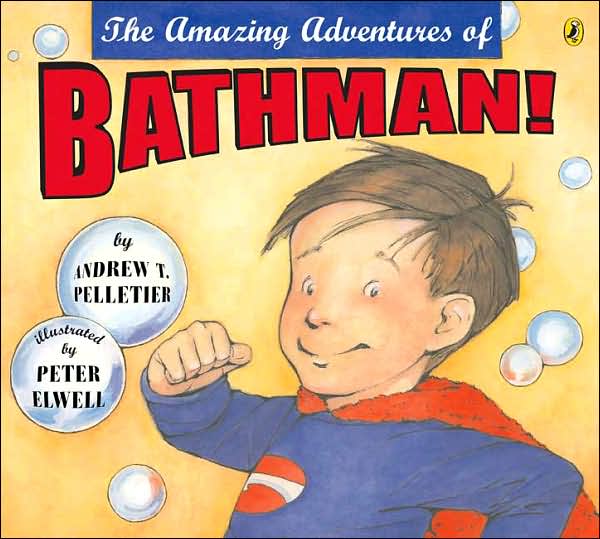 Book Introduction: Start with book upside down. Children will say to "turn it the right way". If not, look at the upside-down book and say, "Oh I can't read it like this, I have to turn it right side up. Read title and point out author/illustrator, running finger under the words.
Book Introduction: Start with book upside down. Children will say to "turn it the right way". If not, look at the upside-down book and say, "Oh I can't read it like this, I have to turn it right side up. Read title and point out author/illustrator, running finger under the words.
 Early Literacy Aside--Explain: Research shows that there are early literacy skills that influence a child's ability to learn to read. Today, you will probably notice several places where I demonstrate examples of narrative skills, which is the ability to describe things and events and to tell stories. When you develop this skill, it will help your children understand what they reads later.Song: Bop 'Til You Drop
Go through the sequence of motions that are in the song, Bop 'Til You Drop
Early Literacy Aside--Example: Singing songs that have a certain order is one great way for children to remember the sequence or order of things. They will use the same skill when they retell a story. They learn how stories work.
Early Literacy Aside--Empower: One thing that you can do at home to develop narrative skills is to describe regular activities such as taking a bath--"first we'll get out the towel, then we'll put the water in the tub and add the bubbles/toys, then we'll take off your clothes, and get in the water. We can scrub our toes, our ears . . . " With older kids, let THEM describe the sequence of events with prompts like, "What do we have to do before we put the bubbles in? or "What do we do next?"
Early Literacy Aside--Explain: Research shows that there are early literacy skills that influence a child's ability to learn to read. Today, you will probably notice several places where I demonstrate examples of narrative skills, which is the ability to describe things and events and to tell stories. When you develop this skill, it will help your children understand what they reads later.Song: Bop 'Til You Drop
Go through the sequence of motions that are in the song, Bop 'Til You Drop
Early Literacy Aside--Example: Singing songs that have a certain order is one great way for children to remember the sequence or order of things. They will use the same skill when they retell a story. They learn how stories work.
Early Literacy Aside--Empower: One thing that you can do at home to develop narrative skills is to describe regular activities such as taking a bath--"first we'll get out the towel, then we'll put the water in the tub and add the bubbles/toys, then we'll take off your clothes, and get in the water. We can scrub our toes, our ears . . . " With older kids, let THEM describe the sequence of events with prompts like, "What do we have to do before we put the bubbles in? or "What do we do next?" Ten little campers make a ring. (Form circle putting tips of fingers together and thumbs together)
Ten little campers start to sing. (Cup hands to mouth)
Ten little campers around the fire. (Form circle putting tips of fingers together again)
Ten little campers dance till they tire. (Put all ten fingers up in the air and dance them around)
Ten little campers say good-night. (Wave good-night with both hands)
Ten little campers close their tent up tight. (Intertwine fingers together again to signify closure)
Early Literacy Aside--Example: Rhymes are fun to sing and say with your child. Because they rhyme, they also help children develop phonological awareness, an important skill for later reading when they try to sound out words.
Ten little campers make a ring. (Form circle putting tips of fingers together and thumbs together)
Ten little campers start to sing. (Cup hands to mouth)
Ten little campers around the fire. (Form circle putting tips of fingers together again)
Ten little campers dance till they tire. (Put all ten fingers up in the air and dance them around)
Ten little campers say good-night. (Wave good-night with both hands)
Ten little campers close their tent up tight. (Intertwine fingers together again to signify closure)
Early Literacy Aside--Example: Rhymes are fun to sing and say with your child. Because they rhyme, they also help children develop phonological awareness, an important skill for later reading when they try to sound out words.